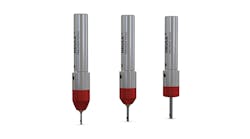Commercial aircraft OEM Airbus SAS has inked a new agreement with the world’s largest titanium producer, expanding their existing supplier arrangement to cover collaborative manufacturing and supply of value-added products and joint-development projects. Most significant, the Memorandum of Understanding between Airbus and VSMPO-AVISMA Corp. identifies a Vertical Integration Project, by which VSMPO would go beyond supplying titanium raw material and forgings but would take on rough machining or pre-machining of titanium parts for the jet builder.
VSMPO-AVISMA, headquartered in Yekaterinburg, Russia, produces titanium, aluminum, magnesium and steel alloys, as raw materials (ingots, billets, and slabs) and semi-finished products (large open-die forgings, rolled rings, profiles, and seamless tubes.) It has operations in Russia, England, Germany, Switzerland, the Ukraine, and the U.S.
Both Airbus and its rival the Boeing Co. have long-term supply agreements with VSMPO for titanium products. The Russian group supplies 60% of the titanium semi-finished products and forgings used by Airbus and its parent company EADS.
“Over the last years, we have worked very hard at Airbus to rationalize and integrate our supply chain to improve efficiency and lead time. We are extremely happy to reinforce our cooperation with our long-term partner VSMPO-AVISMA in the area of vertical integration as it is at the heart of our industrial strategy,” stated Christopher Buckley, the Airbus exec. vice president for Europe, Asia, and the Pacific.
Under the new MoU, Airbus and VSMPO indicate their intent to develop new, proprietary alloys for use by EADS/Airbus. They also raise the possibility of an industrial development in the “Titanium Valley” Special Economic Zone proposed near VSMPO’s Russian headquarters. That project aims to expand the infrastructure for titanium refining and production, and has backing from a wide range of industrial interests as well by the Russian government.
The most notable proposal in the MoU is the partners intention to develop “vertical integration.”
“The development of the vertically integrated production structure is one of the key elements of our strategy,” stated VSMPO general director Mikhail Voevodin. “This is undoubtedly a big advantage and will enable us to better control the costs and the quality of our products during the whole production cycle. Our marketing policy is about ‘being closer to the customer’ and we are using all possible opportunities for this.”









